Calendar
The Three Hierarchs: Saint Basil the Great, Saint Gregory the Theologian and Saint John Chrysostom
12. February 2015 - 11:10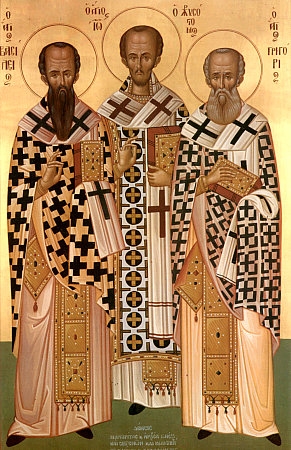 Each of these saints have their own feast day. St. Basil the Great, January 1; St. Gregory the Theologian, January 25; and St. John Chrysostom, January 27. This combined feast day, January 30, was instituted in the eleventh century during the reign of Emperor Alexius Comnenus.
Each of these saints have their own feast day. St. Basil the Great, January 1; St. Gregory the Theologian, January 25; and St. John Chrysostom, January 27. This combined feast day, January 30, was instituted in the eleventh century during the reign of Emperor Alexius Comnenus.
At one time a debate arose among the people concerning who of the three is the greatest? Some extolled Basil because of his purity and courage; others extolled Gregory for his unequaled depth and lofty mind in theology; still others extolled Chrysostom because of his eloquence and clarity in expounding the Faith. Thus some were called Basilians, others Gregorgians, and the third were called Johannites.
Veneration of Apostle Peter's Precious Chains
29. January 2015 - 12:52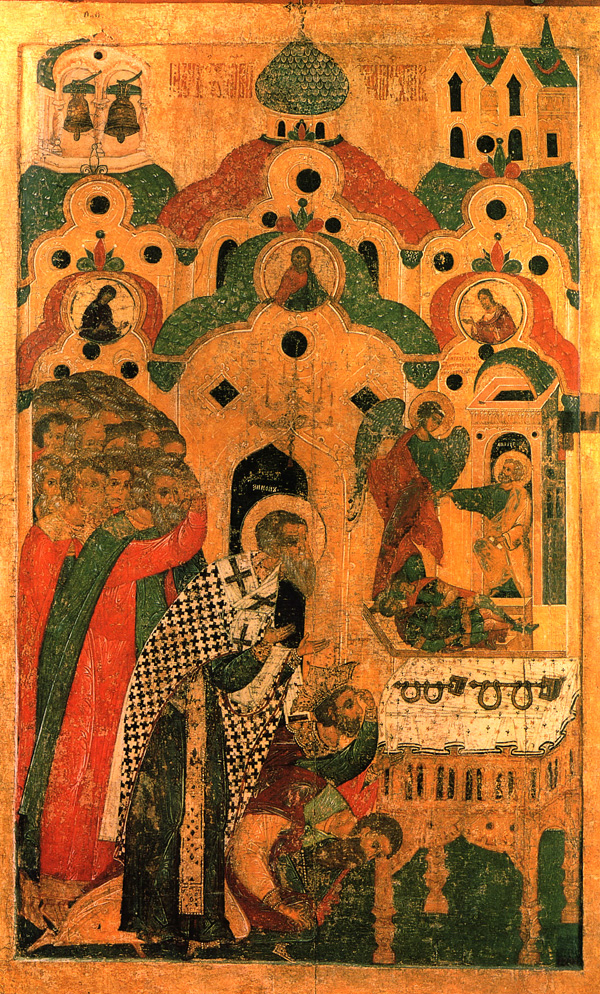 Herod Agrippa, the grandson of Herod the Great and king of the Jews, grew wroth against the Church of Christ, and slew James, the brother of John the Evangelist. Seeing that this pleased the Jews, he took Peter also into custody and locked him up in prison, intending to keep him there until after the feast of the Passover, so that he could win the favour of the people by presenting him to them as a victim. But the Apostle was saved when he was miraculously set free by an Angel (Acts 12:1-19). The chains wherewith the Apostle was bound received from his most sacred body the grace of sanctification and healing, which is bestowed upon the faithful who draw nigh with faith.
Herod Agrippa, the grandson of Herod the Great and king of the Jews, grew wroth against the Church of Christ, and slew James, the brother of John the Evangelist. Seeing that this pleased the Jews, he took Peter also into custody and locked him up in prison, intending to keep him there until after the feast of the Passover, so that he could win the favour of the people by presenting him to them as a victim. But the Apostle was saved when he was miraculously set free by an Angel (Acts 12:1-19). The chains wherewith the Apostle was bound received from his most sacred body the grace of sanctification and healing, which is bestowed upon the faithful who draw nigh with faith.
That such sacred treasures work wonders and many healings is witnessed by the divine Scripture, where it speaks concerning Paul, saying that the Christians in Ephesus had such reverence for him, that his handkerchiefs and aprons, taken up with much reverence, healed the sick of their maladies: "So that from his body were brought unto the sick handkerchiefs or aprons, and the diseases departed from them, and the evil spirits went out of them" (Acts 19:12). But not only the Apostles' clothing (which certainly touched the bodies of the sick), but even their shadow alone performed healings. On beholding this, people put their sick on stretchers and beds and brought them out into the streets that, when Peter passed by, his shadow "might overshadow some of them"(Acts 5:15). From this the Orthodox Catholic Church has learned to show reverence and piety not only to the relics of their bodies, but also in the clothing of God's Saints.
Synaxis of the Holy Glorious Prophet, Forerunner and Baptist John
19. January 2015 - 20:38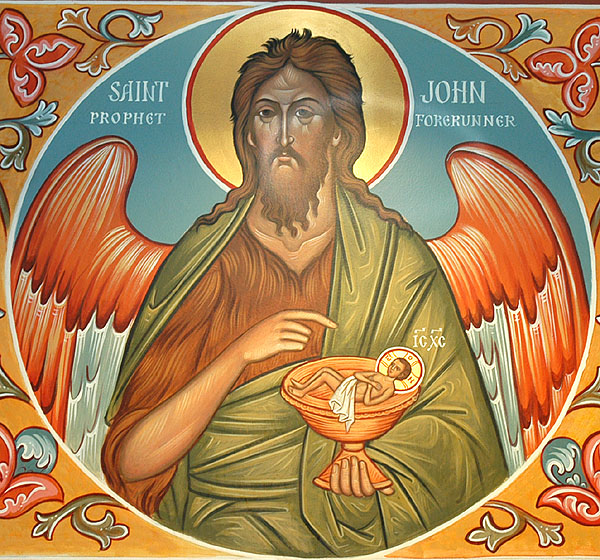 In the Orthodox Church it is customary, on the day following the Great Feasts of the Lord and the Mother of God, to remember those saints who participated directly in the sacred event. So, on the day following the Theophany of the Lord, the Church honors the one who participated directly in the Baptism of Christ, placing his own hand upon the head of the Savior.
In the Orthodox Church it is customary, on the day following the Great Feasts of the Lord and the Mother of God, to remember those saints who participated directly in the sacred event. So, on the day following the Theophany of the Lord, the Church honors the one who participated directly in the Baptism of Christ, placing his own hand upon the head of the Savior.
Homily on the Theophany
18. January 2015 - 23:26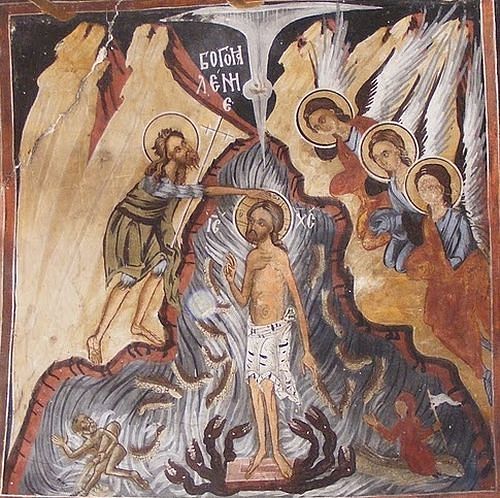 On the day of the feast of Theophany—the Baptism of the Lord—it is not out of place to remember another baptism: that baptism which was performed over each of us Orthodox Christians, that baptism at which each of us, by the mouth of our godparents, gave a promise to God that he would always renounce Satan and his works and would always unite himself, “join himself” with Christ.
On the day of the feast of Theophany—the Baptism of the Lord—it is not out of place to remember another baptism: that baptism which was performed over each of us Orthodox Christians, that baptism at which each of us, by the mouth of our godparents, gave a promise to God that he would always renounce Satan and his works and would always unite himself, “join himself” with Christ.
This, I repeat, is especially fitting for this present day. The solemn rite of the Great Sanctification of Water will be performed shortly. Its center, its main part, one could say, is the majestic prayer wherein the Lord is glorified and the grace of the Holy Spirit is called down upon the water being sanctified. This prayer begins with the beautiful words: “Great art Thou, O Lord, and marvelous are Thy works, and no word sufficeth to hymn Thy wonders.” Whoever has been at a performance of the mystery of Baptism and was present attentively, knows that the prayer at the sanctification of the water in which a man will be baptized begins with these same words, and the first part of this prayer is completely the same, both at the Great Sanctification of Water and at the performance of the mystery of Baptism. And only later, in the last part, does the prayer at the performance of the mystery of Baptism change, as applicable to this mystery, when a new human soul will be baptized.
Saint Basil the Great, Archbishop of Caesarea
14. January 2015 - 9:31![]() Basil was born during the reign of Emperor Constantine. While still unbaptized, Basil spent fifteen years in Athens where he studied philosophy, rhetoric, astronomy and all other secular sciences of that time. His colleagues at that time were Gregory the Theologian and Julian, later the apostate emperor. In his mature years he was baptized in the river Jordan along with Euvlios his former teacher. He was Bishop of Caesarea in Cappadocia for almost ten years and completed his earthly life fifty years after his birth. He was a great defender of Orthodoxy, a great light of moral purity, a religious zealot, a great theological mind, a great builder and pillar of the Church of God. Basil fully deserved the title "Great." In liturgical services, he is referred to as the "bee of the Church of Christ which brings honey to the faithful and with its stinger pricks the heretics.
Basil was born during the reign of Emperor Constantine. While still unbaptized, Basil spent fifteen years in Athens where he studied philosophy, rhetoric, astronomy and all other secular sciences of that time. His colleagues at that time were Gregory the Theologian and Julian, later the apostate emperor. In his mature years he was baptized in the river Jordan along with Euvlios his former teacher. He was Bishop of Caesarea in Cappadocia for almost ten years and completed his earthly life fifty years after his birth. He was a great defender of Orthodoxy, a great light of moral purity, a religious zealot, a great theological mind, a great builder and pillar of the Church of God. Basil fully deserved the title "Great." In liturgical services, he is referred to as the "bee of the Church of Christ which brings honey to the faithful and with its stinger pricks the heretics.
Synaxis of the Most-Holy Theotokos
8. January 2015 - 11:07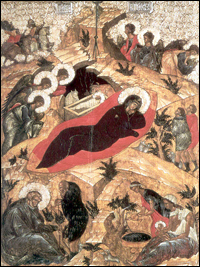 On the second day of Christ’s Nativity, the Church unites its joy over the newborn Saviour of the world with a fervent glorification of the Mother of God. And throughout all the days of the celebration of Nativity, this joy is indivisible for us. In venerating the Lord, we venerate His Mother. In worshipping the Sun of truth in the Orient from on high, we glorify the One Who, like the dawn, precedes this sun. And not only precedes, but carries within Herself and bears into the world this Divine life and light. Heaven and earth gaze in awe upon the incomprehensible honor of the Virgin Who is called the Mother of God – the Mother of the One Who created heaven and earth. “Behold the handmaiden of the Lord,” – says the Holy Virgin, but God calls Her His Mother. She is the Mother and a hand-maiden at the same time, always the Mother and always a handmaiden, just as Her Son – God and Man – is always God and always Man.
On the second day of Christ’s Nativity, the Church unites its joy over the newborn Saviour of the world with a fervent glorification of the Mother of God. And throughout all the days of the celebration of Nativity, this joy is indivisible for us. In venerating the Lord, we venerate His Mother. In worshipping the Sun of truth in the Orient from on high, we glorify the One Who, like the dawn, precedes this sun. And not only precedes, but carries within Herself and bears into the world this Divine life and light. Heaven and earth gaze in awe upon the incomprehensible honor of the Virgin Who is called the Mother of God – the Mother of the One Who created heaven and earth. “Behold the handmaiden of the Lord,” – says the Holy Virgin, but God calls Her His Mother. She is the Mother and a hand-maiden at the same time, always the Mother and always a handmaiden, just as Her Son – God and Man – is always God and always Man.

